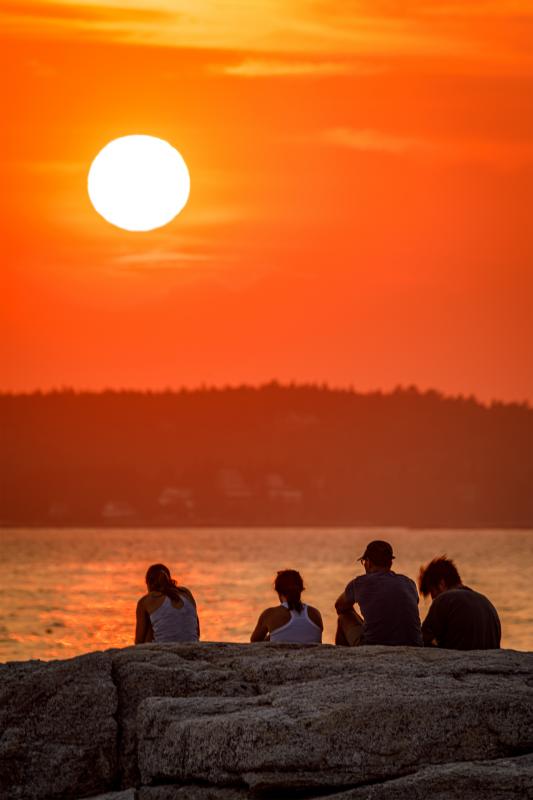It’s all about light
Whether it’s a sunrise in the harbor, a sunset on Ocean Point or a clear view of the Milky Way, there are lots of reasons to carry a camera to capture some of the wonderful light that can be found in the region. And how you go about collecting that light is what makes all the difference toward making your best shot.
Early morning and sunsets are mostly the best times to make landscape shots as you’ll have the warmer colors in the sky to add to the composition. But if you are only able to make pictures in the daytime, a filter to seriously consider is a polarizer. Just like sunglasses, a polarizer can be put on your camera lens and rotated to reduce or almost eliminate glare in a scene. It can enhance the blueness of the sky and make clouds look more dramatic.
A very common mistake I see people making is shooting in Auto White balance or AWB. Personally I feel they misspell it as it should be spelled “Awful” instead of “Auto.” AWB will zap the colors from your image leaving you with hours of color correction processing to do in an editing program to restore the colors you saw. Taking the usually less than 10 seconds before you shoot to simply set the white balance in your camera will yield better colors and save you all that processing time. Setting White Balance is embarrassing simple — look in the menu for White Balance with words like ‘Sunny,’ ‘Daylight,’ ‘Cloudy’ or ‘Shade,’ and you will see modes for Fluorescent and Incandescent or Tungsten light as well. If English is not your native language and these terms look foreign, you can change the language in most cameras to Spanish, French, German, Italian and others. Some cameras make it even easier with icons of a sun, a cloud, a lightbulb, etc. to help get you to the proper white balance and I can confirm no matter what language your camera is set to, the icons are all the same. Setting White Balance is simple to do, is often the most overlooked setting you can make and yet is one of the most important settings you can make to make better images.
Got a cell phone? Yup, you can set white Balance on them too. Android users simply can go to Pro mode and choose the White Balance along with other settings. Apple users must download an application to restore those functions that were removed. Adobe Lightroom is an excellent free app that restores the camera functions to most Apple phones allowing you to make your best shot.
Another setting to consider is to capture in camera Raw mode – or DNG mode. This affords the very highest quality capture you can make with your camera as you can make many adjustments to your image after you take the picture. This includes changing the exposure by plus or minus 5 whole f/stops, changing white, balance if you accidentally shot in AWB and about 45 other parameters. Even if you are not processing Raw files today, it is important to be capturing in Raw so that later you’ll have that ability to edit and enhance your photos. There are services where you can send your Raw files for processing and receive back very high quality JPG files for printing and more. Some calendar companies will even ask for a JPG file for submission and if your image is chosen they will want a Raw file — if you cannot supply that then you may be disqualified. It is about impossible to go back and reshoot a scene to make it look identical to how you first saw it — especially where there is wildlife involved — so my advice is shoot in Raw and JPG simultaneously. That way you get your JPG files you are used to but when you want to further edit or submit an image for a contest you’ll automatically have the raw file available.
Once you become familiar with the settings on your camera it’s time to go out and make some images.
Sunrise Lighthouse Photography Cruise
Since most lighthouses in Maine have an Easterly exposure it is only natural to want to photograph them in the morning with the sun rising in the East. Sept. 12 is the date for the now annual Sunrise Lighthouse Photography cruise. This excursion leaves Pier 8 at 6 a.m. sharp and we get to see the area lighthouses under the very best light. Tickets for this cruise are available and may be bought at Balmy Days Cruises. On this cruise you will see the area lighthouses under the very best light and, unlike a traditional harbor tour, we will be stopping the boat to insure you get the very best shots. This is a rain or shine event so plan accordingly with camera protection gear.
Host photographer Mike Leonard will be aboard to answer your photography questions and to help guide you to making your best shot.
This is the only confirmed photography cruise happening in the state of Maine this year. Tickets are available and it would be worth booking now as the attendance will likely be limited do to physical distancing that will be practiced.
Follow Mike at his Website www.phototourismbymike.com where you can learn about photo services he provides including Raw file processing, slide scanning, videotape transfers to DVD and more.
Event Date
Address
United States
























